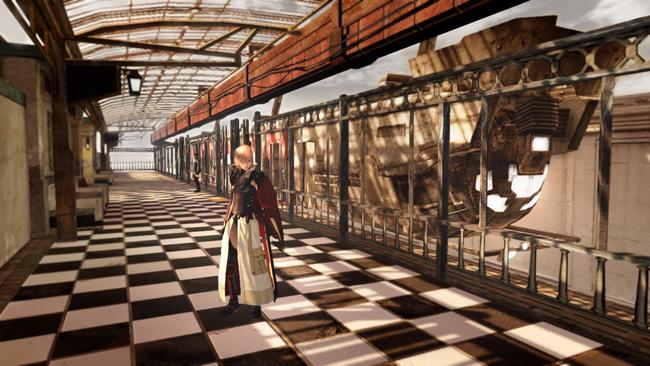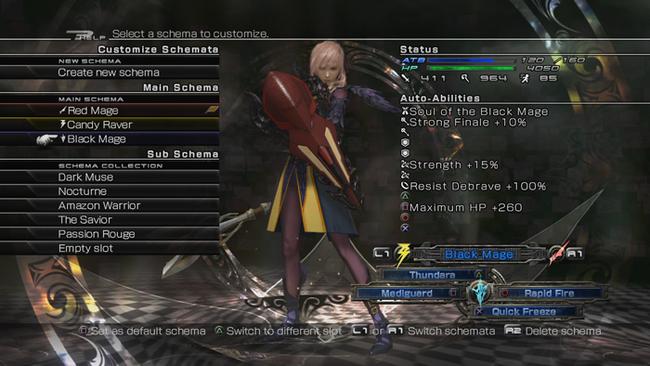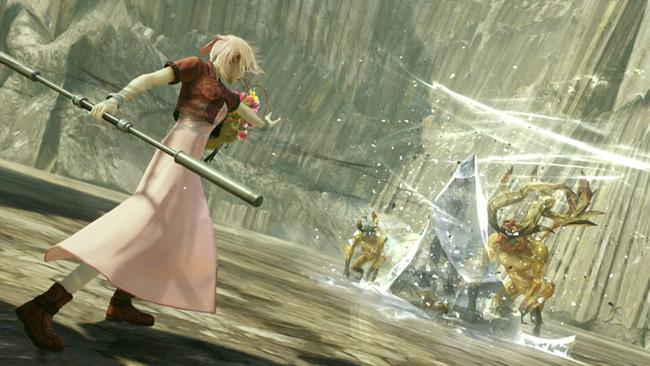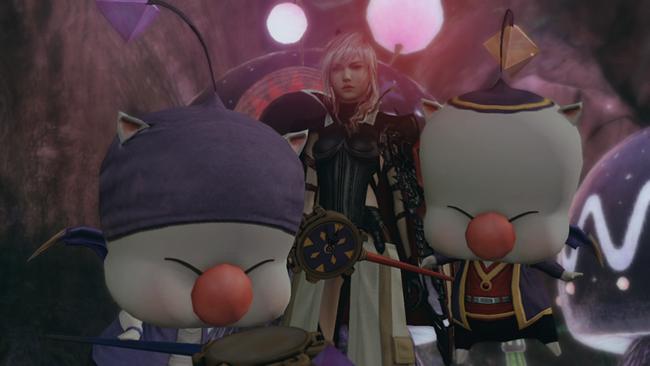
Lightning Returns: Final Fantasy XIII foresaw the series’ future
It can be lonely at the top - something Lightning Farron from the Final Fantasy XIII trilogy of games can likely attest to. The elite soldier defies fate in Final Fantasy XIII before becoming a god-like entity in the sequel, Final Fantasy XIII-2. While Lightning's appearance in the sequel is limited, she makes a comeback in the final game of the trilogy, aptly named Lightning Returns: Final Fantasy XIII.
In this game, she is somehow even more lonely - this time waking up centuries after the end of XIII-2, with the world and her friends changed, if around at all. Lightning Returns, like its predecessors, has plenty of issues. Yet it's elegant combat system is both a drastic departure from it's sister games, and a perfect balance of the series' strategic gameplay and flamboyant stylings. In fact, the experimental nature of the game coupled with its nigh-perfect mix of RPG mechanics and action-style combat is one the series continues to chase.
Lightning Returns was released in Japan in November 2013, arriving in the West a few months later. The opening is striking - she is alone, traveling a diminished and dying world to rescue souls. When watching the opening sequence and tutorial, we happen across Snow, whose personality and demeanor is markedly different. I can only imagine what is going through the mind of someone who only played XIII before jumping directly into this game. The setting, plot, and dynamic between existing characters are so wildly different, at times it seems as if a completely different game and in-game universe. It disregards the plot and lore established, especially the chunk of XIII's ending retconned and re-established in XIII-2.

Despite those shakeups, once the plot is laid bare - Lightning is again going to fulfill a mission at the behest of God in an attempt to save her sister - it's very clear that not everything is what it seems with this lauded God, Bhunivelze, who only speaks to Lightning in the guise of her friend Hope. He was a teenager in XIII, an adult in XIII-2, but is inexplicably reverted to a teenager again in this game. This development is acknowledged, if never satisfactorily explained, but contributes to a sense that Bhunivelze is obfuscating something from Lightning. It also highlights the dissonance between these characters and the world that has been re-built in the 500 years since we've last seen Lightning. The Fal'cie might be dead and gone, and Lightning may be a god in her own right, but she still is taking orders from a nebulous deity who, as the game clearly telegraphs, is deceiving her.
I'm a fan of the XIII trilogy - remaster coming when, Square Enix - but I am the first to admit the series has issues. XIII was too linear and confining, but it was deeply committed to its ludonarrative. It might make sense from a story perspective that you are not able to revisit areas, pick up sidequests, or shoot the breeze with NPCs - you are hunted fugitives for the bulk of the game - but the taut gameplay mechanics in service of that narrative dulled the game's opening hours. Sure it opens up, eventually - but even combat in the opening chapters doesn’t yield experience, making the first hours a true slog. Regardless, XIII had a bittersweet and poignant ending, and the narrative felt complete.

At least until the sequel, which subverted XIII's ending entirely. It retained XIII's stellar combat, but nearly everything else was different. The playable cast from XIII is cast aside to play as Serah, this time on her own quest to find her sister. The Farron family have the most exhausting ways of demonstrating love. XIII-2 introduced time travel and a host of other mechanics, including a gimmick where the third party member was a monster recruited by Serah during her travels. Yes, it was fun to level up a Red Chocobo to use in combat, but was it necessary? That's the frustration I have with most of XIII-2: most of the changes felt as if the developers spent too much time on GameFaqs forums between 2010 and 2013. Listening to fan feedback is nice, but the course corrections sometimes feel like over-corrections. Sure, not only could you go where you want from the start of the game, you could also go when you wanted. Try and find a corridor in this game!
Lightning Returns doubles down on the Mad Libs style exposition word salad - the game doesn't tell us how, why, or when she is chosen, but tells us that Lightning has been chosen to collect souls, and that she is doing it out of a sense of obligation to reunite with Serah. Almost nothing else makes sense - why is the world ending in thirteen days? For real, why is Hope here? Did the developers listen to the three people on GameFaqs complaining about how saccharine Mog was in XIII-2? We also have the existence of Lumina, one of Lightning's primary antagonists who mostly taunts her with riddles and looks almost exactly like Serah. While it is nice to see them again, the opportunities to revisit the main cast of XIII feel as if they were written by artificial intelligence or a reboot of a TV show produced by people who never saw the original.
I sound like I hate the game, and I promise I don't. I might just hate the plot, and maybe even the game's non-threatening time mechanic. While the world is going to end, the time can be extended by completing side quests or expending some of Lightning's EP. Ultimately the mechanic is little more than an annoyance, as I was able to extend my time so I was able to complete the majority of side quests and missions before the finale. It might not be my favorite device, but I do appreciate how, if nothing else, the developers were unafraid to experiment with gameplay elements throughout the trilogy, even if some of the mechanics fall flat.

Despite the drastic shifts in tone, plot, and even characterization between XIII and XIII-2, the combat remained relatively stable and is personally regarded as a high point for the series during an awkward transition between consoles. Even that was tossed out with Lightning Returns, replaced with thrilling action RPG combat that combines elements of the Paradigm Shift combat system with class-based sensibilities, and a whole lot of player customization. The result is a thrilling combat system that was perhaps the series' pinnacle effort in attempting to perfect the blend of action and RPG genres. It's one Square Enix is still chasing down with recent entries, including VII Remake, Stranger of Paradise, and even Final Fantasy XVI.
The changes to the combat system may be a response from criticism that XIII's combat was too boring. Rather than macromanaging the roles of a party of three, Lightning is the sole playable character. Instead of managing the roles of all party members at once and shifting on the fly, Lightning gets to equip a handful of "Schemata" at any time. Each schema consists of garb (attire), a weapon, shield, accessories, and assignable abilities. Each schema has its own ATB gauge, which is reduced by using abilities. Players must shift between schemata during battle to respond as necessary, but also to recharge each gauge.
It's frenetic, messy, and brilliant. Almost as if Final Fantasy XIII rifled through the job system of Final Fantasy V but stopped for a chat with the dress spheres of Final Fantasy X-2 on the way home.. The DNA of FFV and FFX-2 is strong, and that must be part of the reason why the combat is so addictive. I typically balk when games remove levels, item management, or even party members - things I consider hallmarks of an RPG. Lightning Returns does this in spades. While this would typically leave me avoiding combat unless necessary, I am not dodging fights in this game because they are too much fun.

The same applies with managing schemata in lieu of a handful of specific roles. I was unbothered that Lightning couldn't level up, or even that stat progression is tied to quest completion or the other small tweaks to the gameplay loop set forth by the prior two titles. The need for strategy and planning is still there, allowing players to customize their loadouts to the point of nearly breaking the game. Factor in the ornate, hilarious, and sometimes fan service garb for Lightning, and there is plenty of material for a stat-obsessed RPG head to get lost in.
Playing it again, a decade later and in between Final Fantasy XVI and VII:Rebirth, I think the game would get a warmer reception if remastered or re-released. Lightning Returns: Final Fantasy XIII is a divisive, experimental game and some parts are less successful than others. The discourse surrounding what defines an RPG can be exhausting - doubly so when it's about Final Fantasy. This game benefits a bit from being a black sheep of sorts from the family - it's holding on to "Final Fantasy" in the title for dear life. But its willingness to experiment with various levels of success is perhaps what makes it a sublime example of the spirit of Final Fantasy - transformative and transgressive, and mostly unapologetic about it.